
With the death of the Queen, the Duke of York’s exile from the working monarchy looks certain to be permanent.
Charles is now the new King and any decision about Andrew, disgraced after paying out millions over a civil sexual assault case, will fall to him, no doubt in consultation with his eldest son and heir, the Duke of Cornwall and Cambridge.
Royal author Robert Jobson wrote that William had, unlike Charles, cut off all contact with his uncle.
 The Prince of Wales, the Duke of York and the Duke of Cambridge at the Duke of Edinburgh’s funeral (Leon Neal/PA)
The Prince of Wales, the Duke of York and the Duke of Cambridge at the Duke of Edinburgh’s funeral (Leon Neal/PA)
“There will be no public role or comeback for York, if the Duke of Cambridge has any input on the matter – and let me assure you, he does,” a source told Jobson.
“He should be banished, as far as Prince William is concerned.”
But Andrew’s place in the family remains as the royals grieve for their matriarch.
The duke rushed to his mother’s bedside at Balmoral on Thursday, joining Charles, the Princess Royal, the Earl and Countess of Wessex and Camilla, now Queen.
It was William who drove Andrew, who sat in the front passenger seat, with Edward and Sophie in the back, to the Queen’s Scottish home after their RAF flight landed in Aberdeen,
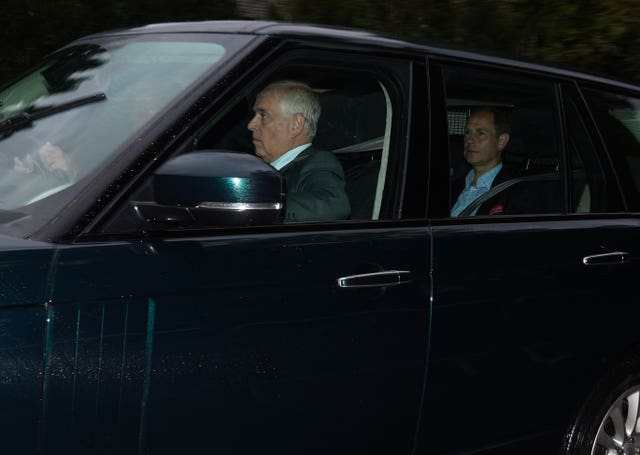 The Duke of Cambridge drives a car carrying the Duke of York, and the Earl and Countess of Wessex to Balmoral (Andrew Milligan/PA)
The Duke of Cambridge drives a car carrying the Duke of York, and the Earl and Countess of Wessex to Balmoral (Andrew Milligan/PA)
Charles will have to decide whether to fund his brother’s lifestyle, as the Queen did.
Andrew is believed to have received an annual salary from the Queen’s £21 million a year private Duchy of Lancaster income.
The Duchy’s assets are held in trust for the sovereign, so are now under Charles’s control.
Questions will also be raised about Andrew’s home, Royal Lodge in Windsor Great Park, which is a Crown Estate property, and also houses his ex-wife Sarah, Duchess of York.
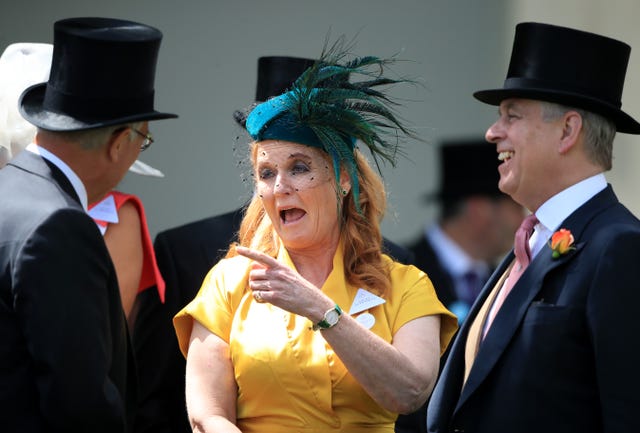 Sarah, Duchess of York and the Duke of York (Adam Davy/PA)
Sarah, Duchess of York and the Duke of York (Adam Davy/PA)
The duke signed a 75-year lease on the mansion in 2003, but could potentially receive millions in compensation for refurbishment costs he carried out if he gives up the 31-bedroom home.
There are also likely to be further calls for Andrew to be stripped of his dukedom, severing his connection to the city of York.
But peerages can only be removed by an act of parliament – although there are also limited circumstances in which hereditary peerages can be renounced by the holder.
Andrew also remains in the line of succession, and is still a Counsellor of State.
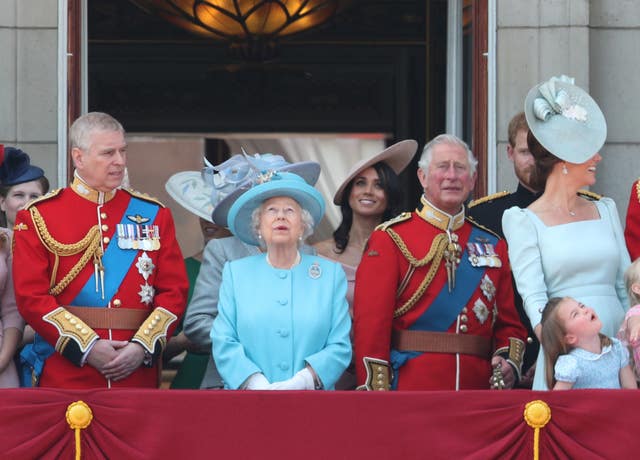 The Duke of York, the Prince of Wales and the royal family at Trooping the Colour celebrations (Yui Mok/PA)
The Duke of York, the Prince of Wales and the royal family at Trooping the Colour celebrations (Yui Mok/PA)
In the event a monarch cannot undertake their official duties as sovereign on a temporary basis due to illness or absence abroad, two or more Counsellors of State are appointed by Letters Patent to act in their place.
The role is undertaken by any spouse of the monarch, Camilla, now Queen, and the next four adults in the line of succession, currently William, Harry, Andrew and the newly added Princess Beatrice.
The arrangements can only be changed with legislation, but the fresh inclusion of Camilla and Beatrice could mean it is less likely this route is explored.
Andrew, grieving for his mother, will make an appearance at the Queen’s funeral, and is likely to process behind her coffin and join a vigil around it with his siblings while it lies in state.
He is likely to want to pay a public on-camera tribute to the Queen, just as he did for his father, the Duke of Edinburgh.
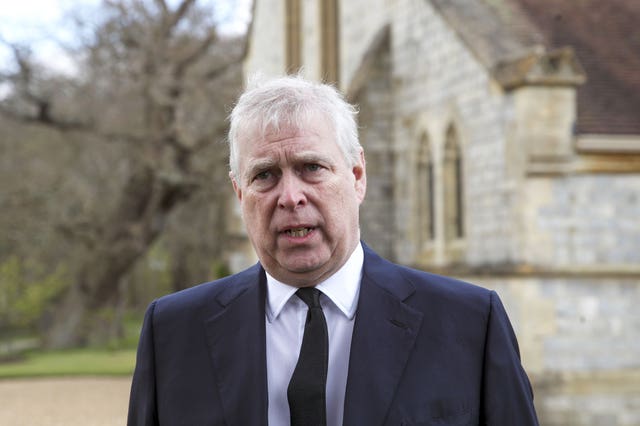 Andrew during a television interview at the Royal Chapel of All Saints, Windsor, following the announcement of the death of his father (Steve Parsons/PA)
Andrew during a television interview at the Royal Chapel of All Saints, Windsor, following the announcement of the death of his father (Steve Parsons/PA)
But Charles and William are expected to want the aftermath of the Queen’s funeral to signal the end of Andrew’s public appearances.
The scenes in Westminster Abbey in March 2022 at Philip’s memorial service left commentators aghast at the duke’s prominent role after his public controversies.
As Andrew walked alongside his mother, the Queen held on to his elbow for support as she moved carefully and slowly to her seat.
Even the Earl of Snowdon, the Queen’s nephew, appeared to do a double take as he turned to look.
Princess Beatrice burst into tears and it was unclear whether it was the sight of her now frail grandmother or her father restored to such an elevated duty that left her overcome with emotion.
The pre-printed Order of Service showed Andrew had actually been due to arrive with his daughters, but he ended up accompanying the Queen in her car to the Abbey.
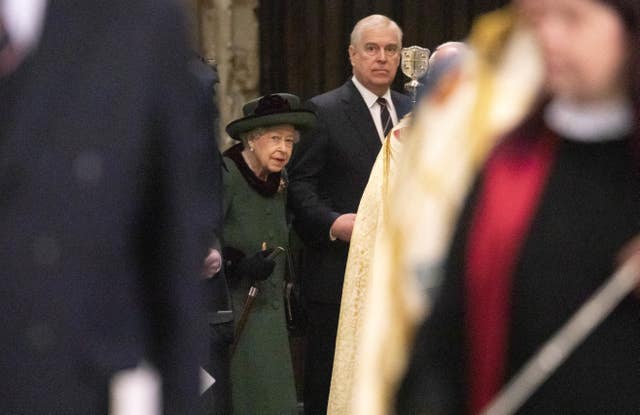 The Queen and Andrew at the service (Richard Pohle/The Times/PA)
The Queen and Andrew at the service (Richard Pohle/The Times/PA)
Even as the arrangements altered, the last-minute plan had been for Andrew to walk behind the Queen, who would be accompanied by the Dean of Westminster.
This led to claims the duke had strong-armed his mother into letting him take centre stage and that she could not say no to her so-called favourite son.
Just weeks before, the duke had paid millions out of court to Virginia Giuffre, a woman he claimed had never met, who was suing him for allegedly sexually assaulting her when she was 17 and had been trafficked by billionaire paedophile Jeffrey Epstein.
Andrew had already stepped down from public duties after his disastrous Newsnight interview in 2019, in which he failed to show remorse for his friendship with Epstein and display any sympathy for the financier’s victims.
As Ms Giuffre’s lawsuit gathered pace, the Queen finally moved, at the urging of William and Charles, to strip her second son in January 2022 of his honorary military titles and forbid him from using his birthright HRH style.
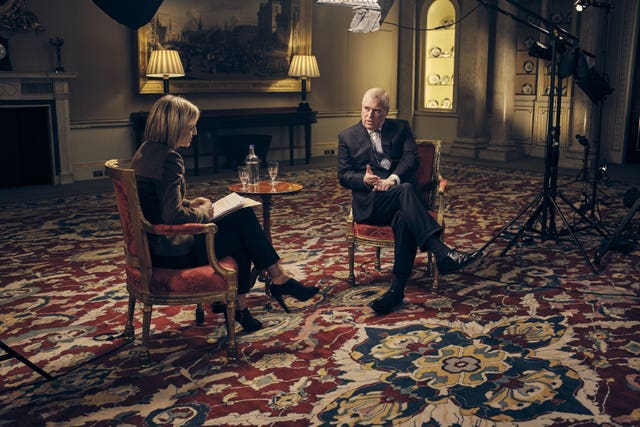 The Duke of York speaking about his links to Jeffrey Epstein in an interview with BBC Newsnight’s Emily Maitlis (Mark Harrison/BBC/PA)
The Duke of York speaking about his links to Jeffrey Epstein in an interview with BBC Newsnight’s Emily Maitlis (Mark Harrison/BBC/PA)
Andrew had been booted out of the monarchy.
But his key role at his father’s memorial service showed that at family occasions, even major televised ones, he was, as far as the Queen was concerned, welcome.
This was said to be met with dismay from Charles and William, and there was concern that Andrew was moving to wrangle a return to national life, particularly at the Platinum Jubilee celebrations.
He stayed behind closed doors for the Jubilee in the end, having contracted Covid.
His bid to join the public royal procession on Garter Day soon after in 2022 was scuppered when Charles and William lobbied the Queen, insisting he only attended the private service and lunch.
The Queen was a staunch supporter of her son, but with the loss of his mother, Andrew looks set to remain in the royal wilderness.



Why are you making commenting on The Herald only available to subscribers?
It should have been a safe space for informed debate, somewhere for readers to discuss issues around the biggest stories of the day, but all too often the below the line comments on most websites have become bogged down by off-topic discussions and abuse.
heraldscotland.com is tackling this problem by allowing only subscribers to comment.
We are doing this to improve the experience for our loyal readers and we believe it will reduce the ability of trolls and troublemakers, who occasionally find their way onto our site, to abuse our journalists and readers. We also hope it will help the comments section fulfil its promise as a part of Scotland's conversation with itself.
We are lucky at The Herald. We are read by an informed, educated readership who can add their knowledge and insights to our stories.
That is invaluable.
We are making the subscriber-only change to support our valued readers, who tell us they don't want the site cluttered up with irrelevant comments, untruths and abuse.
In the past, the journalist’s job was to collect and distribute information to the audience. Technology means that readers can shape a discussion. We look forward to hearing from you on heraldscotland.com
Comments & Moderation
Readers’ comments: You are personally liable for the content of any comments you upload to this website, so please act responsibly. We do not pre-moderate or monitor readers’ comments appearing on our websites, but we do post-moderate in response to complaints we receive or otherwise when a potential problem comes to our attention. You can make a complaint by using the ‘report this post’ link . We may then apply our discretion under the user terms to amend or delete comments.
Post moderation is undertaken full-time 9am-6pm on weekdays, and on a part-time basis outwith those hours.
Read the rules hereLast Updated:
Report this comment Cancel